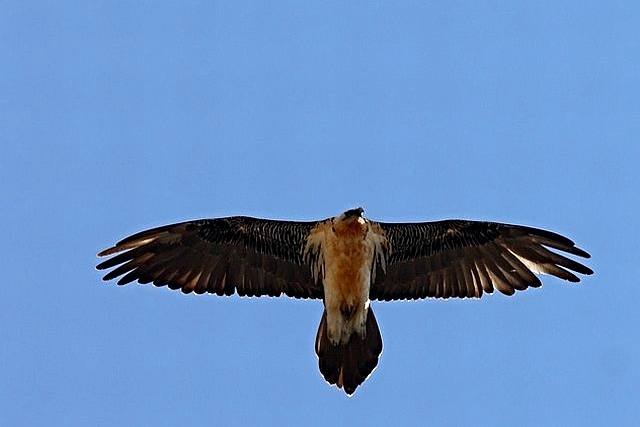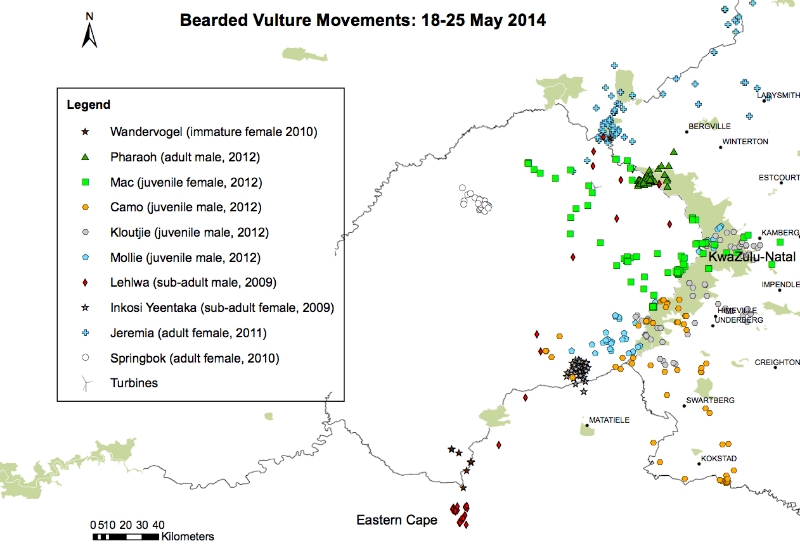Grim Outlook for South Africa’s Bearded Vultures
The BeardedVulture Gypaetus barbatus is classified as
Near Threatened on the IUCN Red List of Threatened Species. This species has been uplisted in 2014 owing to evidence that is has undergone a moderately rapid population decline over the past three generations. It is widely and disjunctly distributed across the Palearctic, Afrotropical and Indomalayan regions, but is very rare in some areas and thought to be in decline overall. In southern Africa, including South Africa, the population is estimated at c. 100 breeding pairs and around 100 known nest sites, though only 60 – 70% of these have been active over the last years. Many nest sites in peripheral areas have been abandoned and the breeding range has reduced in size. It is assumed that this is as a result of increased human disturbance at these sites, either infrastructural developments or increased population density and intensity of farming activities.
The Bearded vulture breeds throughout the uKhuhlamba – Drakensberg Park, but the majority of nest sites are found in eastern Lesotho, in the Maloti Mountains. Sani Pass and the area at the top of the pass (Lesotho) are the best sites for seeing this beautiful bird. The other accessible sites would be the ‘vulture restaurants' at Giants Castle, Sterkfontein, Golden Gate and Cathedral Peak.
The main causes of on-going declines appear to be non-target poisoning, direct persecution, habitat degradation, disturbance of breeding birds, inadequate food availability, changes in livestock-rearing practices and collisions with powerlines and wind turbine.
In South Africa, poisoning is one of the primary causes of mortality. Some birds fitted with satellite tracking devices have been killed by poison. Bearded Vultures are often accidentally poisoned when feeding on poisoned bait meant for jackal. Since all vulture species are particularly sought after in the traditional medicine trade, the Bearded Vulture is not spared from deliberate poisoning, although they may be more difficult to target. Many herdsman still believe that the birds prey on lambs and deliberately shoot or poison them.
Collisions with energy structures such as powerlines and wind farms remain the next biggest threat to the species. The proposed construction of a wind farm on the Drakensberg’s northeastern escarpment will accelerate the vultures’ demise. One can expect that for every 10 turbines at least one vulture will be killed every year.

Bearded Vultures inhabit harsh environments where many animals succumb to the affects of adverse weather and accidental deaths in steep, hostile and inaccessible terrain. Land use change over the past few decades has resulted in large scale transformation of their habitat making supplementary feeding a necessary conservation management action.
A recent paper published in Ibis shows that African bearded vulture populations have reduced genetic variability and have little interpopulation variability. The authors conclude that this level of reduced genetic diversity can be added to the threats to the species in Africa. Maintaining high levels of genetic diversity is essential for a species to survive. These low levels of diversity were most likely caused by the drastic range reduction experienced by the population over the past three centuries, more recently attributed to anthropogenic factors resulting in a low effective population size.
In the regional Red List (Eskom Red Data Book of Birds of South Africa, Lesotho and Swaziland), the Bearded Vulture is listed as
Critically Endangered.

In Europe, the population has grown.




